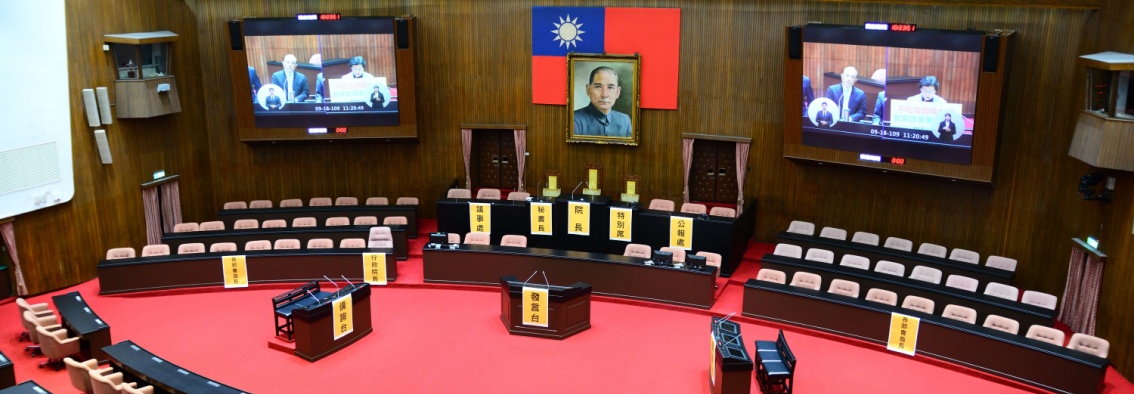There is safety in numbers—such are the rules of the game in Taiwan’s unconventional coalition parliament. Not only is Taiwan navigating a divided government for just the second time in its history, but the most recent election cycle also marks the first occasion since 2004 that the Legislative Yuan (LY, 立法院) lacks a majority party. Coalition building has therefore emerged as a vital electoral strategy in Taiwan’s current political landscape, from adapting to the polarized outcomes of a rare three-party competition in the 2024 presidential and legislative elections to sparking cooperation and condemnation alike during the unprecedented 2025 “Great Recall” (大罷免) movement.
Image: The recall results on July 26, 2025, echo the public’s majority support for the KMT’s Hou Yu-ih and the TPP’s Ko Wen-je in the 2024 Taiwanese presidential election. (Interactive image created by author)
Although the short-lived proposal for a joint 2024 presidential ticket between the Kuomintang (KMT, 國民黨) and the Taiwan’s People’s Party (TPP, 民眾黨) can serve as a “cautionary tale” of overzealous collaboration, this informal alliance between the island’s main opposition parties is actively reshaping Taiwanese politics. In the wake of the initial recall election results, the growing KMT-TPP coalition will likely continue to transform Taiwan’s domestic affairs and the future of US-Taiwan relations.
The evolution of inter-party alliances offers important lessons regarding novel political strategies and shifting public support within Taiwan’s evolving opposition party ecosystem. Against the backdrop of the July 2025 recall campaign outcome, this article will examine the implications of the KMT-TPP coalition for Taiwan’s political future in the context of the upcoming 2026 local and 2028 general elections.
Image: Taiwan’s presidential election results from 1996 to 2024 visualized by party, with notable resemblance between the plurality victories in the 2000 and 2024 elections. (Interactive image created by author)
The Rise and Fall of Third Parties: The Political Underpinnings of Taiwan’s 2024 Election
After nearly four decades of two-party dominance, the rise of viable third-party contenders in 2024 set the stage for coalition building. In Taiwan’s political history, party coalitions are not unheard of, but they often pose considerable risks to the underdog. For instance, the People’s First Party (PFP, 親民黨) ran an unsuccessful joint presidential ticket with the KMT in 2004 against the DPP’s Chen Shui-bian (陳水扁). Multiple “Third Force” (第三勢力) political parties also emerged out of the 2014 Sunflower Movement, including the New Power Party (NPP, 時代力量), the Social Democratic Party (SDP, 社會民主黨), and the Taiwan Statebuilding Party (TSP, 台灣基進). The NPP has been largely regarded by voters as a “small Green” party in the DPP’s shadow due to their highly consistent policy agendas. Making matters worse, NPP politicians faced public scandals and an identity crisis over whether to endorse former President Tsai Ing-wen (蔡英文) or their former leader Huang Kuo-chang (黃國昌) in the 2020 election. That same year, the TPP overtook the NPP to become Taiwan’s third-largest party.
Founded in 2019 by former Taipei City Mayor Ko Wen-je (柯文哲), the TPP distinguished itself from the DPP and the KMT for its unique flavor of pragmatism. Notably, the party attracted ample young voter support for its focus on economic “bread-and-butter” concerns. Had the 2024 election consisted solely of voters aged 20 to 29, it is estimated that TPP Chair Ko Wen-je would have won the presidency. This surge in support was amplified by several factors: growing discontentment with establishment parties, rising “pro-status-quo” cross-Strait attitudes among Taiwan’s younger generation, and Ko Wen-je’s popularity on social media platforms such as Instagram and TikTok.
In the lead-up to the 2024 race, negotiations to officiate a KMT-TPP “marriage” involved Ko Wen-je, the KMT’s Hou Yu-ih (侯友宜), former President Ma Ying-jeou (馬英九), KMT Chair Eric Chu (朱立倫), and independent Terry Gou (郭台銘), who later withdrew from the race. Proposed on November 15, 2023, a KMT-TPP joint presidential ticket between Hou Yu-ih and Ko Wen-je offered Taiwan a path to establishing a majority “Blue-White” alliance (藍白合) and changing cross-Strait relations. However, before the Taiwanese electorate could weigh in at the polls, the unity ticket imploded on live television mere days after its announcement. While such a joint ticket posed a serious challenge to the incumbent Democratic Progressive Party (DPP, 民進黨)—which was projected to capture only a plurality of votes—no final agreement was reached on whether the KMT or TPP candidate would run for president amid clashes over polling data. On November 24, both parties went their separate ways, each registering their candidates individually for the 2024 election.
A Bird’s-Eye View of the Aftermath of the 2024 Taiwanese Presidential and Legislative Elections
On January 13, 2024, as the world watched one of the first major contests in the biggest election year in human history, DPP candidate and former Vice President Lai Ching-te (賴清德) won 40.05 percent of the Taiwanese electorate’s support, marking the party’s third consecutive presidential victory. In second place, the KMT’s Hou Yu-ih secured 33.49 percent of the vote, followed by 26.46 percent for the TPP’s Ko Wen-je. As Taiwan’s first election since 2000 to be won without a majority, the outcome of the 2024 election reveals a more complex, pluralistic story—one that is still unfolding today.
Broadcast in the news and publicized by the DPP, the implosion of the KMT-TPP joint presidential ticket haunted opposition prospects in the lead-up to Lai Ching-te’s victory. However, the DPP ended up losing its majority presence in the legislature for the first time since 2004, dropping to 51 out of 113 seats while the KMT and TPP increased their representation to 52 and 8 seats, respectively. With both the DPP and KMT lacking a clear majority of their own, the TPP ascended to a new seat of power as the legislative “kingmaker.”
Despite the party’s newfound influence in the legislature, TPP presidential hopeful Ko Wen-je experienced a swift and severe “fall from grace.” Detained since September 5, 2024, Ko is facing a potential sentence of over 28 years in jail on corruption charges. In addition, suspended Hsinchu City Mayor Ann Kao (高虹安)—previously the first TPP-elected municipal leader and one of the party’s “most high-profile rising stars”—was found guilty of corruption in July 2024. Nevertheless, despite problematic leadership challenges, the TPP moved to take advantage of its control of a “critical voting bloc” in the legislature through an informal coalition with the KMT.
In May 2024, the KMT-TPP alliance passed controversial amendments to the Legislative Yuan Exercise of Official Powers Law (立法院職權行使法). Many voters were unhappy with these reforms, serving as the catalyst of the 2024 Bluebird Movement (青鳥行動), which amassed over 100,000 protestors in Taipei on May 24. Emerging from the Bluebird Movement, the recall campaign attempted to remove at least six opposition lawmakers to flip the legislative balance of power. In advance of the “Great Recall” elections, pro-recall demonstrators took to the streets to protest a perceived abuse of power by the legislature. Meanwhile, a whirlwind of rallies and countermovements took place. In one notable example, the opposition parties held an anti-recall rally in front of Taipei City Hall to support the impacted 24 KMT lawmakers and Ann Kao on July 5, 2025, with pro-recall groups organizing their own action on the same day.
Image: While none of the KMT legislators were ultimately recalled, shaded districts in the above map display how “no” votes differed on July 26, 2025, where purple (yellow) represents a legislative district with a higher vote share (i.e., less [more] support for the lawmaker). (Interactive image created by author, with data sources Frozen Garlic and Taiwan Atlas)
“Without the Lips, the Teeth Will Get Chilled” (唇亡齒寒): Lessons from the 2025 Recall Elections
The historically unprecedented “Great Recall” movement turned 2025 into a “de facto campaign year,” as characterized by journalist Brian Hioe (丘琦欣). Yet, the July 26 elections failed to remove a single lawmaker from office. While interpretations vary, Dr. Nathan Batto’s Frozen Garlic election blog found that the results “did not show any evidence of a significant shift in public opinion”; rather, “in general, voters reaffirmed” their decisions from 2024. Previously, a July 14 survey by the Taiwan Public Opinion Foundation (TPOF, 財團法人台灣民意基金會) found that opposition to the recalls outnumbered support by a six percent margin nationally and a greater 11 percent within the recall districts.
In addition to popular support, voter turnout represented another crucial element in the recalls. With an actual turnout rate of 56.2 percent, the KMT and TPP have been re-energized by the recall outcome, but this does not necessarily mean that the parties intend to work together indefinitely. The opposition’s deepened coordination during the recall may have laid the foundation for future Blue-White cooperation, but whether this common ground is sufficiently stable remains an open question. Lastly, whether the DPP concludes that they simply did not mobilize enough, or that they actually “should have done less” in the recall movement, will likely shift the party’s rhetoric and future campaign efforts moving forward.
In the meantime, recent amendments supported by the KMT-TPP coalition to the Civil Servants Election and Recall Act (公職人員選舉罷免法) and the Constitutional Court Procedure Act (憲法訴訟法, CCPA) have escalated tensions to the point of a “constitutional crisis.” By blocking confirmation of seven grand justices nominated by President Lai for a second time in July 2025 as well as enacting budget cuts and revisions to the Act Governing the Allocation of Government Revenues and Expenditures (財政收支劃分法), the opposition parties have coalesced around contesting the DPP’s legislative agenda and will likely continue in the wake of the recalls.
Policy and Cross-Strait Implications of a KMT-TPP Alliance
Analysts are hesitant to predict that the recall results reflect either a widespread endorsement of the KMT’s cross-Strait policies or a shift away from the status quo. One perspective suggests that voters can hold “Taiwan-centric” views while simultaneously rejecting “fearmongering” related to Beijing. The will of the moderate swing electorate was crucial in this vote—as it was in 2024 and throughout Taiwan’s political history. According to TPOF monthly surveys, approximately 27 percent of respondents identified as independent in July 2025, an increase from 22 percent in January 2024. While the DPP’s re-election to the presidency may have affirmed public support for its cross-Strait policy, its failure to capture the legislature through the 2024 elections and 2025 recall votes signals some Taiwanese voters’ desires for executive oversight by the KMT-TPP majority coalition.
Regardless of the outcome of the second round of recalls slated for August 23, gridlock will likely persist in Taiwan’s divided government. Until 2028, President Lai must negotiate with an opposition-controlled parliament, which could have substantial implications for Taiwan’s security. Some anticipate that the KMT will interpret the recall results as a mandate to advance its legislative priorities, notably toward defense spending. For example, researcher Thomas Shattuck projects that the Trump Administration “will likely continue to pressure Taipei” to boost defense spending above three percent of its GDP, even though such a spending increase could be blocked if the opposition parties maintain their stance.
If President Lai cannot raise defense spending, Taiwan may need to pause some of its military programs, including its indigenous submarine plans, to prioritize asymmetric defense. The DPP’s ability to get the KMT and TPP to compromise on their competing visions for Taiwan’s defense and foreign policy budget will be paramount to assuage US concerns over Taiwan’s security. Otherwise, a failure to increase the budget could undermine perceptions of Taipei’s commitment to defense in the eyes of Washington.
Potential Impacts on the 2026 Local and 2028 General Elections
Will “Blue-White” cooperation endure? The recall elections represent a significant step forward for the informal KMT-TPP coalition, but the 2026 local elections will be especially decisive for the TPP’s longevity. The opposition faces two main strategic choices: “moderate their policies and rhetoric” to broaden appeal, or go “scorched earth” and double down on their resistance to the DPP. If the DPP faces backlash in the 2026 local elections due to its recall efforts, this challenge could present a prime opportunity for the KMT-TPP alliance. Even if public opinion closely resembles that of the last elections in January 2024, Taiwan’s major parties will likely reconsider their political strategies to maximize voter appeal and court civil society before the next fast-approaching electoral race.
Coordinating nominations in future elections is essential to the TPP’s long-term success, as indicated by political scientist Kharis Templeman. Mobilization efforts by KMT Taichung Mayor Lu Shiow-yen (盧秀燕) and current TPP Chair Huang Kuo-chang—who confirmed his candidacy in 2026 for New Taipei mayor on August 11, facilitating dialogue with the KMT—were among those crucial to the outcome of the recalls. A Lu-Huang partnership is gaining momentum: sources say Lu, a rising figure among the KMT’s potential candidates for the 2028 race, may seek to work with Huang as a running mate to consolidate non-DPP voters. According to columnist Courtney Donovan Smith’s (石東文) deep dive on Lu’s unorthodox political strategies, not only has Lu historically courted TPP figures such as Ko Wen-je, but her camp also believes that working in coalition with the TPP “will be key” to winning in 2028. Her centrist appeal could attract the support of moderate swing voters—the very same group who was decisive in the recalls. If she decides to run, Lu could cement her control over the KMT by winning the upcoming October 18 KMT leadership election, in which polls position her as the favored candidate among both KMT and TPP voters.
The November 2023 KMT-TPP presidential ticket may have failed, but in light of Taiwan’s history of political alliances, coalitions are always on the table. While continued KMT-TPP collaboration is contingent upon resolving differences in nominating new leadership and coordinating political strategy, valuable insights can be gained from recent events. One easy lesson: consider cutting the live video feed next time.
The main point: In anticipation of the 2026 local government and 2028 general elections, the 2025 “Great Recall” represents a significant step forward for the KMT-TPP alliance, which has the potential to overcome the ghosts of failed coalitions and marginalized third parties in Taiwan’s political history. Emerging from the unique circumstances of the 2024 election, opposition party partnerships can play a pivotal role in the future of inter-party cooperation in Taiwanese domestic policymaking and influence the course of US-Taiwan relations.




